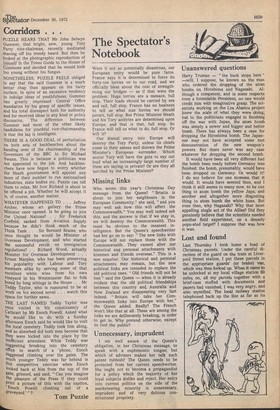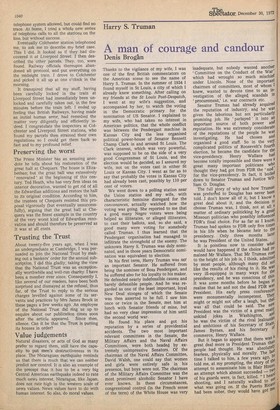The Spectator's Notebook
Were it not so potentially disastrous, our European entry would be pure farce. France says it is determined to force its forty-ton lorries on to our road, and we officially bleat about the cost of strengthening our bridges — as if that were the problem. Huge lorries are a menace, full stop. Their loads should be carried by sea and rail, full stop. France has no business to tell us what size lorries we should permit, full stop. But Prime Minister Heath and his Tory acolytes are determined upon Europe, and that is that, full stop. So France will tell us what to do, full stop. Or will it?
Our dismal entry into Europe will destroy the Tory Party, unless its chiefs come to their senses and disown the Prime Minister's European surrender. Which senior Tory will have the guts to say out loud what an increasingly large number of them are saying in private? Or are they all terrified by the Prime Minister?
Missing links
Who wrote this year's Christmas Day message from the Queen? " Briatin is about to join her neighbours in the European Community," she said, "and you may well ask how this will affect the Commonwealth." You may well indeed ask this, and the answer is that if we stay in, we will destroy the Commonwealth. This must be obvious to the meanest intelligence. But the Queen's speechwriter had her go on to say: "The new links with Europe will not replace those with the Commonwealth. They cannot alter our historical and personal attachments with kinsmen and friends overseas." This is a non sequitur. Our historical and personal attachments may remain, but the new political links are intended to replace the old political ones. "Old friends will not be lost" said the Queen — when it is already evident that the old political friendships between this country and Australia and New Zealand are disappearing very fast indeed. "Britain will take her Commonwealth links into Europe with her," the Queen added. Really? The French won't like that at all. These are among the links we are deliberately breaking, in order to get in. Why pretend otherwise, except to fool the public?
Unnecessary, imprudent
I am well aware of the Queen's obligation, in her Christmas message, to speak with a euphemistic tongue; but which of advisers makes her talk such patent rubbish? The Queen needs to be protected from her current speechwriter. She ought not to become a propagandist for a policy which the majority of her loyal subjects dislike and reject. Her entry into current politics on the side of the marketeering minority is unnecessary, imprudent and of very dubious constitutional propriety.
Unanswered questions
Harry Truman — "the buck stops here" —will, I suppose, be knOvvn as the man who ordered the dropping of the atom bombs on Hiroshima and Nagasaki. Although a competent, and in some respects even a formidable 'President, no one would credit him with Imaginative grasp. The scientists working an the Los Alamos project knew the scale of 'what they were doing:, but to the 'politicians engaged in finishing off the war with Japan, the atom bomb was simply a newer and bigger and better bomb. There has always been a case for dropping the Hiroshima bomb. The Japanese may not have accepted some test demonstration of the new weapon's powers. But there never was any case whatever for dropping the second bomb.
It would have been all very different had the bomb been ready before Germany was finished: the bomb, presumably, would have been dropped on Germany. Or would it? I do not believe for one moment that it would. It would have seemed then, and I think it still seems to many now, to be one thing to atom bomb the yellow „Taps; and another and altogether more disgusting thing to atom bumb the white huns. But even then, why Nagasaki? Why that most appalling single act of the Allies? Did they genuinely believe that the scientists needed another field experiment, on a densely popu-ated target? I suppose that was how it was.
Lost and found
Last Thursday I took home a load of Christmas parcels. Under the careful direction of the guard on the train at 'Liverpool Street station, I put these parcels in the appropriate guard's' (or brake) van, which was then locked up. When it came to be unlocked at my local village station 60 miles on, all my parcels together with a brief-case stuffed with documents and papers had vanished. I was very angry, and also mystified. The local railway station telephoned back up the line as far as its telephone system allowed, but could find no trace. At home, I tried a whole new series of telephone calls to all the stations on the line, but without success.
Eventually Colchester station telephoned me, to ask me to describe my brief case. This I did. It looked as if they had discovered it at Liverpool Street. I then described the other parcels. They, too, were found. Railway officials thereupon abandoned all protocol, and put 'everything on the midnight train. I drove to Colchester and picked it all up at one o'clock in the morning.
It transpired that all my stuff, having been carefully locked in the train at Liverpool Street had immediately been unlocked and carefully taken out, in the few minutes before 'the train left. I ended up feeling that British Railways, having made an initial human error, had remedied the matter very diligently and efficiently indeed. I congratulate the inspectors at Colchester and Liverpool Street stations, who found my 'parcels then strained their own regulations 'so I could get them back so fast and to my profound relief.
Preserving the worst
The Prime Minister has an amusing anecdote he tells about his restoration of the great hall at Chequers. The house is Elizabethan; but the great hall was extensively ' renovated ' at the beginning of this century. Ted Heath, who has very firm ideas on interior decoration, wanted to get rid of all the Edwardian additions and restore the hall to its original condition. According to him, the trustees of Chequers resisted this proposal vigorously (but eventually unsuccessfully), arguing that the great hall at Chequers was the finest example in the country of the very worst kind of Edwardian renovation and should therefore be preserved as it was at all costs.
Trusting the Trust
About twenty-five years ago, when I was an undergraduate at Cambridge, I was persuaded to join the National Trust by making out a bankers' order for the annual subscription. 'I did this gladly, taking the view that the National Trust was an exceptionally worthwhile and well-run charity. 'I have been a member ever since. Consequently I, like several of our readers, have been both surprised and dismayed at 'the refusal, thus far, of the Trust to 'reply to the serious charges levelled against some of its servants 'and practices by Mrs James Brock in these pages a few weeks 'ago. An employee of the National Trust did ring us up to enquire about our publication times soon after the article appeared. Since then, silence. Can it be that the Trust is putting its houses in order?
Value judgements
Natural disasters, or acts of God as many prefer to regard them, still have the capacity to put men's destructiveness in its place. The 'Nicaraguan earthquake reminds us that there is much that we can neither predict nor 'control. It is also an 'example of the 'precept that it has to be a very big Central American earthquake indeed to rate much news interest. Nicaragua, like Japan, does not rate high in the western scale of news values. News values have to do with human interest. So alas, do moral values.



































 Previous page
Previous page